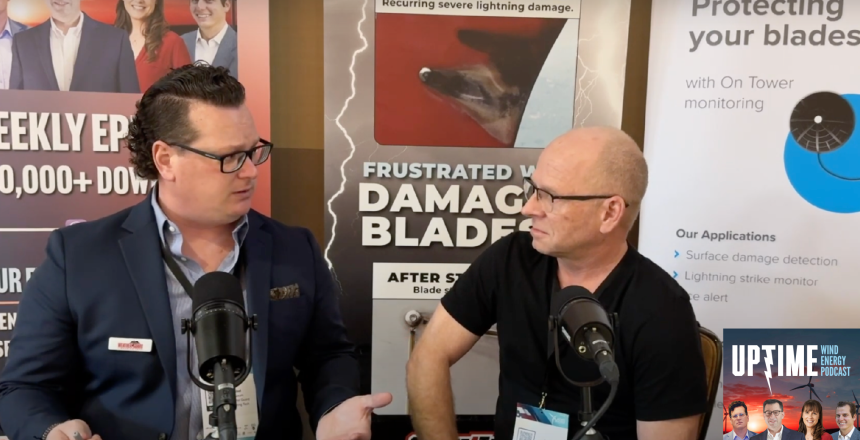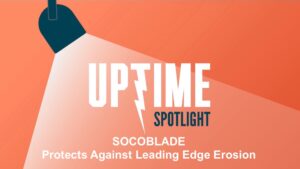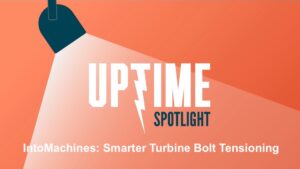Blade Repair Academy is a campus for wind turbine technicians, a controlled training environment that was designed by experienced blade repair technicians to teach others the art (and the science) of wind turbine maintenance and blade repair.
Alfred Crabtree is Blade Repair Academy’s founder and its CEO. Before founding the 4300-square foot facility about 40 miles north of Chattanooga, Tennessee, Crabtree spent more than six years performing repairs of wind turbine blades on ropes and platforms – and then developed and ran a large-scale composite training program.
If 6 years doesn’t sound like very long, consider that it is 20% longer than the average blade repair technician spends in the field.
Joel Saxum watched Crabtree’s presentation at Blades USA and had to learn more. Crabtree agreed to an interview, and this article highlights some of their conversation.
The full recording can be heard for free here and – at just 23 minutes long – it’s well worth your time.
The World Needs More Blade Repair Technicians
There’s a high rate of attrition for blade repair technicians, which bleeds expertise from the professional ranks faster than many high-burnout jobs. Consider the number of construction workers and firefighters and other physically and mentally draining careers. Those jobs take heavy tolls, but the majority of people in those and other similarly demanding roles retire from those careers.
Simply put, there’s just hardly any reasonable comparison.

For one thing, the US Department of Labor doesn’t even list “Blade Repair Technician” as a job. “’Blade repair’ is one line item in the (description for) Wind Turbine Technician,” Crabtree said.
And that’s just the start of the problem. When the job doesn’t exist in the Department of Labor catalog, the career path can only be described as unclear.
“That’s not incumbent upon (the Department of Labor),” Crabtree points out. “It’s incumbent on the industry to create that description.”
Crabtree, Blade Repair Academy, and others in the wind energy field are working with the Department of Labor to create a listing for the occupation. It’s one of several initiatives that are happening simultaneously and quickly, out of necessity, in an industry that is being forced to standardize and professionalize while it grows to meet increasing demands worldwide.
While the IRA bill includes an item to help fund apprenticeship programs for just the type of training Blade Repair Academy provides, Crabtree notes that government funds or tax breaks can be a double-edged sword. There have been numerous examples of training dollars being exhausted when large corporations quickly establish in-name-only ‘apprenticeship programs’ that are essentially meaningless because they do not adhere to industry-wide protocols. While deserving clients sometimes receive the benefits of such efforts, the programs do not advance the industry or the blade repair profession.
How Do Blade Repair Technicians Learn Their Jobs?
Whether it’s skillfully handling a grinder, reading a work order, or working at heights, existing training programs really don’t accurately reflect what a wind turbine technician deals with in the field.
And yet, on-the-job (and often, on-the-blade) training is pretty typical in the wind energy world.
“It can take half a season to find out the quality of work, which is terrifying,” Crabtree said.
That is why Blade Repair Academy focuses on hands-on learning by doing, repetitively, in a controlled environment.

“When you’re upon a blade, you have very little cognitive bandwidth left,” he said. And up on that blade, there are so many steps you need to do, in just the right order, to keep yourself safe, remaining mental capacity must be devoted to completing the task at hand.
Because the Blade Repair Academy founders have practical experience in the field, they know a few things that may seem counterintuitive to a hiring manager. Things like, “the techs who are really, really good at their jobs may not be great teachers,” Crabtree said.
In fact, the techs who are great under pressure are often head-down, get-it-done types who are rarely inclined to take the time to instruct someone else or let them demonstrate newly-learned skills. Adding to the stress of the situation, quite often time-frames are severely shortened due to weather conditions and other uncontrollable factors.
A variety of classes are offered, focusing on the fundamentals, on working with composites, on applying new methods, requirements and technologies, and on more specific repair techniques for LE/TE bond line splits and transverse cracks to spar cap and tip repairs.
In addition to classes, employers can send new hires to the Academy to be vetted or rated before going on assignment. Otherwise, there are few if any ways to assess competency until a blade tech is in the field.
Wind Energy’s New Technology Demonstration Center?
Crabtree said the Academy is also finding increasing interest in using the campus as a technology demonstration center. Companies that need a controlled environment to trail new materials and technologies, such as UV curing and infusion, have been pleased with the ease of use of facilities at the Academy.
Confidence is gained by working through the unknown, and this can involve mistakes. – Blade Repair Academy
For more information visit the Blade Repair Academy website or contact Crabtree on LinkedIn.
Photo credit: Blade Repair Academy






